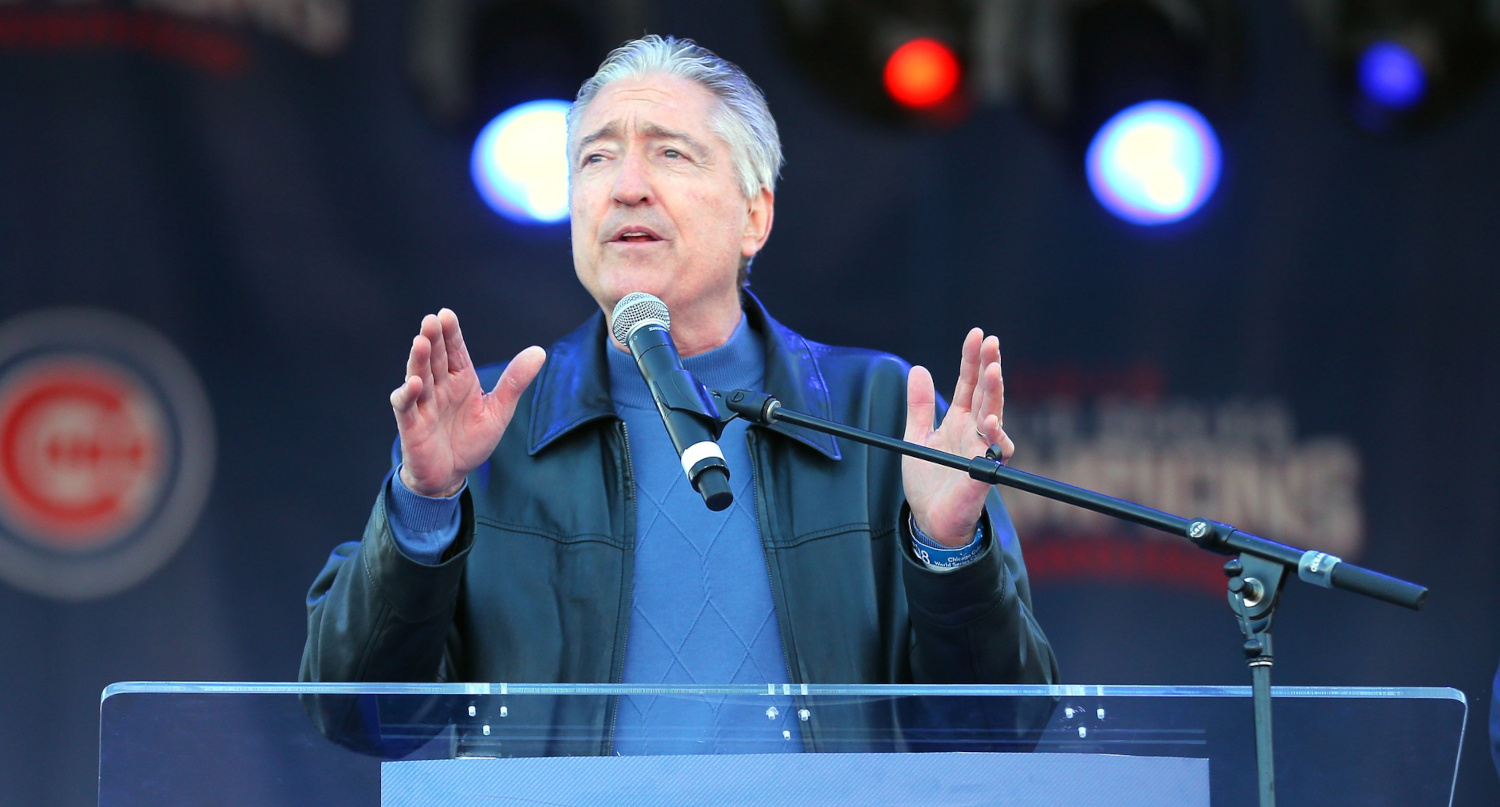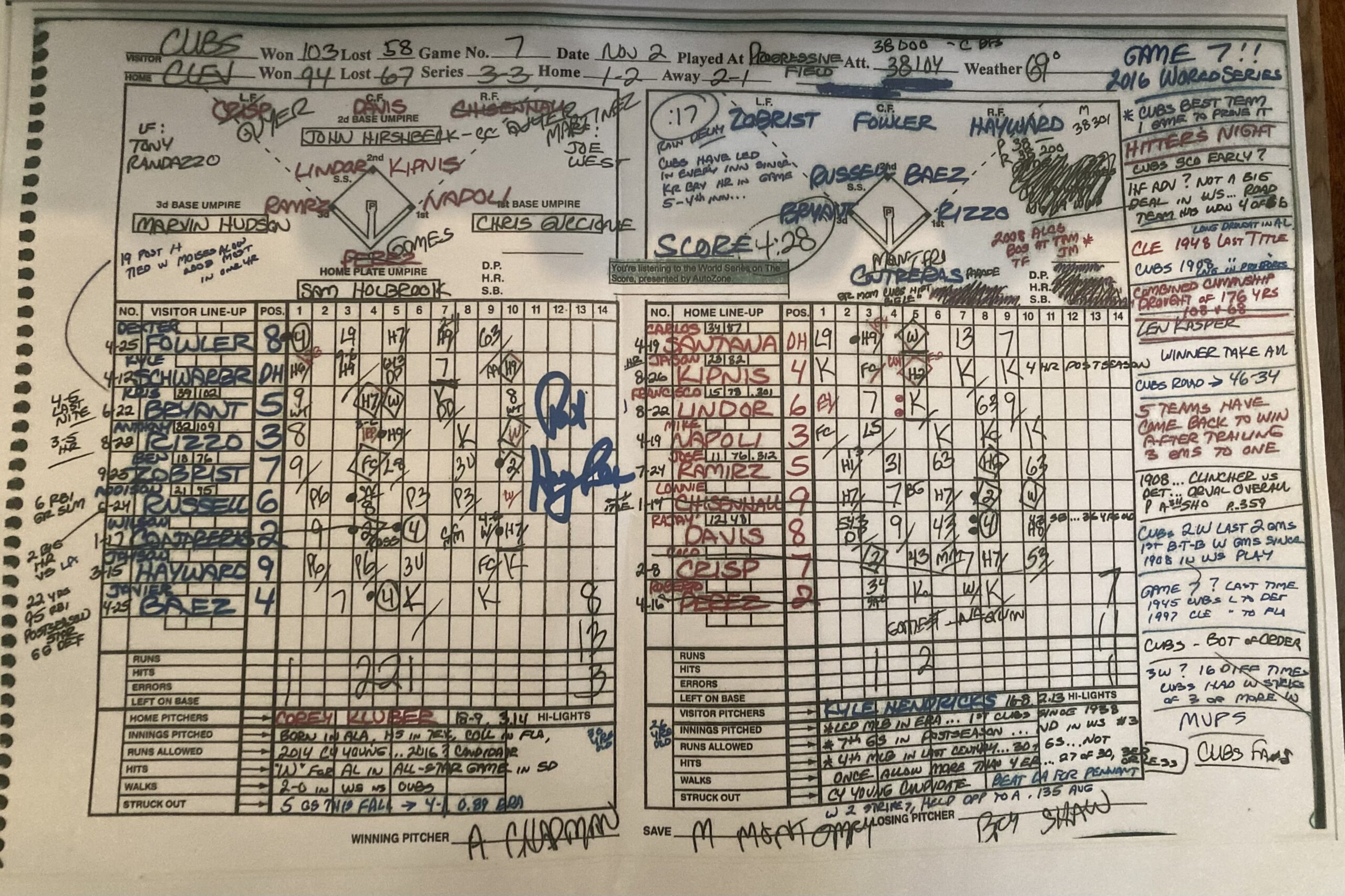© 2026 ALLCITY Network Inc.
All rights reserved.

I don’t hold on to too much baseball memorabilia, but one of the things I have kept is a large, color facsimile of Pat Hughes’ scorecard from Game 7 of the 2016 World Series. It’s a peek into the longtime Cubs radio broadcaster’s mind. That’s one of the reasons I hold onto it when I gladly give away most of the other baseball stuff I get.
There are a handful of notes to himself around the margins, but mostly it is his meticulous documentation of the most important game the Cubs have ever played. The most important game he has ever called and most likely will ever call.
I have talked with Hughes a handful of times in the Wrigley Field press box, mostly exchanging pleasantries. I’m not one to get starstruck, but I’ll admit he’s an exception. In person, he conveys the same understated ebullience and steadiness we hear on the radio. He talks with the smile you feel like you can hear in his voice.
On Wednesday, Hughes was inducted into the Baseball Hall of Fame as the 2023 Ford C. Frick Award winner.
He has been a finalist twice before, in 2016 and 2020, and with his induction this year, Hughes joins former Cubs broadcasters Jack Brickhouse, elected in 1983, and Harry Caray, elected in 1989. The award is given based on what Cooperstown calls “major contributions” to baseball. Considering we often have trouble agreeing which players have done enough to merit being in the Hall even though we have access to detailed statistics of their careers, the mostly intangible contributions of a broadcaster must be even harder to work with. But Hughes is an easy case.
“No one is more deserving of this award than Pat,” Cubs chairman Tom Ricketts said in a press release. “Outside of his impressive resume, Pat is a truly wonderful person who cares deeply about Cubs fans and the game of baseball. We’re so incredibly lucky to have had him as a member of the Cubs family.”
Hughes joined the Cubs in 1996. That’s 27 straight seasons as the voice of Chicago’s North Side baseball team. In that time, he has called eight no-hitters, nine postseasons, and in his third season in the booth, Kerry Wood’s 20-strikeout game against the Astros. He called Sammy Sosa’s home run race with Mark McGwire in 1998, Carlos Zambrano’s no-hitter in Milwaukee in 2008 and the final out of the World Series in 2016.

Huge moments, each. As he calls them, Hughes is logging a part of baseball history.
“I don’t stop and think about it too much,” Hughes said of those moments. “I’m aware of them, I’m aware of the moments that I’ve been fortunate enough to cover. … I always tell people, you’re a radio announcer. First and foremost, be true to your radio audience. Make the final call accurately and clearly.”
“I’ve gone back and been able to listen and watch some of that,” manager David Ross said of his own best moments in a Cubs uniform, all voiced by Hughes, “and to hear those calls and hear his voice, that’s how I identify those moments. That’s the voice I hear now rather than the thoughts I used to have in the box. I’ve watched those from time to time, and I hear his voice and his call and his excitement. He’s been here for so long and seen so many ups and downs. That’s the longevity of all that and going through the good and the bad. That’s why he’s just such a special person.”
Close to three decades of holding the same job are usually enough to invite a little cynicism into anyone’s outlook. It’s really tough to look at the same thing, day after day, for that long and not become a little jaded, especially when that thing has been the source of a lot of disappointment and heartbreak.
No Cubs fan needs to be reminded of the many down moments that Hughes witnessed and had to describe between 1996 and the final game of the 2016 World Series. Dropped balls, 100-loss seasons, a foul ball into the seats in 2003 that felt almost paradigm-shifting, and even after the World Series, the decline of the core that won it and their one-by-one departure from the franchise.
But a part of Hughes’ gift throughout his time with the Cubs has been his unceasing freshness. He is 67 years old but seems both much older and much younger at the same time. Hughes has a lightness of being that is as rarified in current culture as his status among baseball broadcasters.
“I’m big on having a few laughs every single day, ” Hughes said. “If the Cubs win, we laugh more, but even when they don’t win, we still find some humor in some things.
“To me, being at the ballpark has always been a fun thing.”
Hughes is quick to credit his audience for some of the joy he has in his work.
“I feel a great closeness to our listeners. It’s one of the best audiences you could possibly have as a performer,” he said. “They really do appreciate the effort that I give.”
Reading over his Game 7 scorecard again, it is clear that he was weighing both the magnitude of the night and the reality that in many ways it would be a baseball game just like all of the others. Hits to record, runs scored, outs made, innings pitched, lineup changes.

It is also clear that he was enjoying the heck out of that game like he does at any other point in a season, whether the Cubs are in the playoffs, are competing for the division or are in the midst of a double-digit losing streak. Every time you see Hughes, he is at least smiling with his eyes. Always earnest and genuine without being sappy. He takes simple pleasure in each game, no matter its significance, and he reminds the rest of us to do the same.
That is his great contribution to the game of baseball.
CHGO’s Ryan Herrera contributed to this story.
Comments
Share your thoughts
Join the conversation



